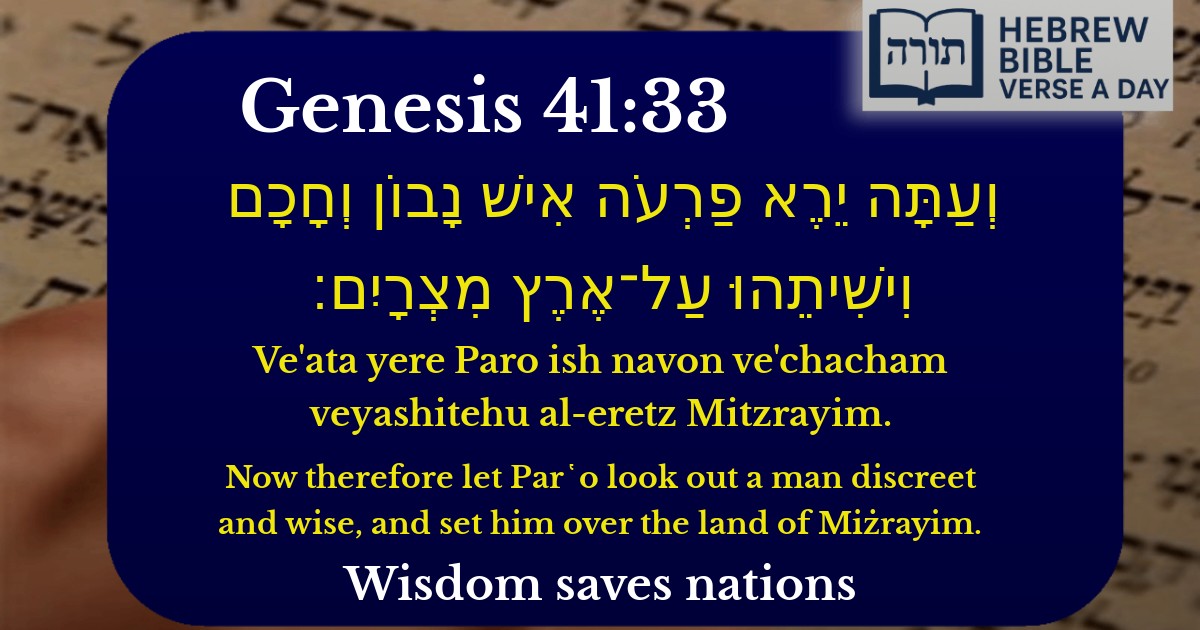Join Our Newsletter To Be Informed When New Videos Are Posted
Join the thousands of fellow Studends who rely on our videos to learn how to read the bible in Hebrew for free!
Hebrew Text
וְעַתָּה יֵרֶא פַרְעֹה אִישׁ נָבוֹן וְחָכָם וִישִׁיתֵהוּ עַל־אֶרֶץ מִצְרָיִם׃
English Translation
Now therefore let Par῾o look out a man discreet and wise, and set him over the land of Miżrayim.
Transliteration
Ve'ata yere Paro ish navon ve'chacham veyashitehu al-eretz Mitzrayim.
Hebrew Leining Text
וְעַתָּה֙ יֵרֶ֣א פַרְעֹ֔ה אִ֖ישׁ נָב֣וֹן וְחָכָ֑ם וִישִׁיתֵ֖הוּ עַל־אֶ֥רֶץ מִצְרָֽיִם׃
וְעַתָּה֙ יֵרֶ֣א פַרְעֹ֔ה אִ֖ישׁ נָב֣וֹן וְחָכָ֑ם וִישִׁיתֵ֖הוּ עַל־אֶ֥רֶץ מִצְרָֽיִם׃
🎵 Listen to leining
Parasha Commentary
📚 Talmud Citations
This verse is not quoted in the Talmud.


Context of the Verse
This verse (Genesis 41:33) is part of Yosef's interpretation of Pharaoh's dreams, where he advises Pharaoh to appoint a wise and discerning administrator to prepare for the upcoming years of famine. The verse reflects Yosef's wisdom and foresight, as well as his understanding of governance and Divine providence.
Rashi's Commentary
Rashi explains that Yosef's suggestion to Pharaoh was not merely administrative but also a subtle hint that Pharaoh himself should appoint Yosef for this role. The term "נָבוֹן וְחָכָם" (discreet and wise) implies someone who can both interpret dreams (as Yosef had just done) and implement practical solutions. Rashi notes that Yosef's wisdom here aligns with the principle that one who foresees a problem should take steps to address it (based on Talmudic teachings in Tamid 32a).
Rambam's Perspective
Rambam (Hilchos Melachim 2:6) discusses the qualities of a leader, emphasizing that a ruler must be wise and discerning to manage a nation effectively. Yosef's recommendation aligns with this ideal, as he identifies the need for a leader who can oversee food storage and distribution—a critical role during times of crisis. Rambam would view this as an example of hokhmah (practical wisdom) applied for the public good.
Midrashic Insights
Halachic Implications
The Shulchan Aruch (Choshen Mishpat 2:1) cites the importance of appointing qualified leaders, derived from verses like this one. A leader must possess both binah (understanding) and chokhmah (wisdom) to make sound judgments, reflecting Yosef's criteria for Pharaoh's appointee.
Symbolism and Lessons
This verse teaches the importance of proactive leadership and the value of wisdom in governance. Yosef's advice underscores that true wisdom involves not only foreseeing challenges but also preparing practical solutions—a lesson applicable to both individual and communal life.